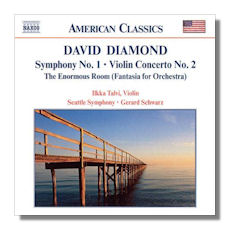
The Internet's Premier Classical Music Source
Related Links
-
Find CDs & Downloads
Amazon - UK - Germany - Canada - France - Japan
ArkivMusic - CD Universe
Find DVDs & Blu-ray
Amazon - UK - Germany - Canada - France - Japan
ArkivMusic-Video Universe
Find Scores & Sheet Music
Sheet Music Plus -
Recommended Links
Site News
David Diamond

(1915 - 2005)
An important American neoclassicist between the World Wars, David Diamond (July 9, 1915 - June 13, 2005) studied with both Roger Sessions and Natalie Boulanger, among others. He came to prominence with his first four symphonies and his songs and kept winning important prizes for his work. He also mentored younger composers, notably Leonard Bernstein and Charles Strouse. However, for years he couldn't find a teaching job and actually made his living by playing violin in Broadway pit bands and by getting grants. After the war, due in part to the McCarthy persecutions, he moved to Europe for over a decade, returning to the United States in the Sixties.
The musical climate, however, was hostile to Diamond's music. The post-Webernian serialists and the avant-garde had gained a hegemony in the critical discussion over what was worthwhile contemporary music. Not only Diamond, but Aaron Copland, Walter Piston, Howard Hanson, Samuel Barber, and others found themselves on the outs. Diamond, however, continued to receive commissions as well as, at last, a teaching appointment in the Juilliard composition department. Incidentally, he once asked Arnold Schoenberg for lessons in the serial method. Schoenberg refused, supposedly replying, "Why do you want to do that? You're the next Bruckner. I never meant it for everybody." Eventually, he retired and devoted himself to his own music. He created an impressive symphonic cycle, a great deal of wonderful chamber music, and, again, a body of great songs.
His music comes from the broad American neoclassical tradition, although he allows more acute dissonance than somebody like Piston, perhaps due to his work with Sessions. He died in his home town of Rochester, New York, a few days short of his 90th birthday. ~ Steve Schwartz
Recommended Recordings
 Symphonies
Symphonies
- Symphony #1; The Enormous Room; Violin Concerto #2/Delos DE3119 reissued as Naxos 8.559157
-
Gerard Schwarz/Seattle Symphony Orchestra
- Symphonies #2 & 4; Concerto for Small Orchestra/Delos DE3093 reissued as Naxos 8.559154
-
Gerard Schwarz/Seattle Symphony Orchestra
- Symphony #3; Psalm; Kaddish/Delos DE3103 reissued as Naxos 8.559155
-
Gerard Schwarz/Seattle Symphony Orchestra
- Symphony #4 w/ Harris & Thompson/Sony SMK60594
-
Leonard Bernstein/New York Philharmonic Orchestra
- Symphony #8; Tom Suite #1; This Sacred Ground/Delos DE3141 reissued as Naxos 8.559156
-
Gerard Schwarz/Seattle Symphony Orchestra















